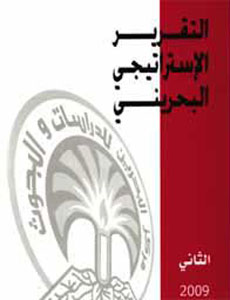
|
 |
 |
|
|
|
|
|
|
|
|
|
|
|
|
|
|
|
|
|
|
|
|
|
|
Bahrain in the Strategic Report (2009)
The Bahrain Centre of Research and Studies has released its second strategic report, which contains frank discussions of internal problems facing Bahrain at the local and international levels. In its report, the Centre presented its comments on the general situation as follows: ■ With regards to foreign workers and the abolishment of the ‘sponsor system’, the report states that the abolished law represents an insult to human rights and that abolishing it is a progressive and humanitarian step in line with human rights principles. However, the abolishment of the system has led to many problems such as an increase in unemployment, which in turn has increased crime rates and the level of unemployment among Bahrainis. ■ The report discusses freedom of press, and most importantly the call for issuing a new law, which allows more freedom and prevents the imprisonment of journalists. The report emphasized that the issuing of such a law is a solution to most problems in this regard. ■ Concerning human rights, the report pointed to the cases that had been raised during the last two years in relation to women, children, human trafficking and torture, among others. The report explained that there are some reports, which concluded that the state of human rights is deteriorating, and highlighted the Bahrain’s fulfillment of its commitments to the Human Rights Council. Regarding torture, the report recalled the pre-reform situation and the clashes and violations that took place, asserting that political societies are demanding the punishment of perpetrators of torture during that period. Also, the report pointed to the establishment of some human rights institutions, some of which visited Bahraini prisons and some others called to implement transitional justice. The report stated that arrests were made during clashes in demonstrations and concluded that human rights issues and political ones have been confused. This phenomenon is common among many human rights organizations in the third world because they are newly established institutions with little experience, in addition to the fact that the state itself is emerging. ■ The report observes that Bahrain is experiencing a dynamic condition and a positive movement, and pointed to the wide margin of freedom of assembly and protest which has become a prominent feature of political life in Bahraini society. By analyzing cultural, political and economic activities in the country, which included seminars, lectures, protests, strikes and workshops among others, the report considers this a reflection of a dynamic society despite its shortcomings. ■ The report also points to the fact that political societies, despite occasionally engaging in sectarianism, have shown improvement and maturity in their activities in the last two years. It notes the existence of sectarian alignments between political societies in the House of Representatives with or against ministers belonging to other sects. ■ The report allocates a large space for the issue of sectarianism, including the hitherto unexplored role of the House of Representatives. It states that sectarianism in Bahrain is increasing and has foreign roots and that the gap between the two main social components, Shia and Sunni, is widening. The report also notes that a great deal of issues are being politicized and interpreted in a sectarian manner such as the issues of housing, naturalization and employment, among others. ■ The report notes that protests, which demand improvements in basic living needs, were organized according to sectarian lines, Sunni and Shia, including private majalis or gatherings. It also points to a limited sectarian dispute which took place in Muharraq due to a Shia religious occasion. It adds that sectarianism is also a factor in employment prospects in some governmental, quasi-governmental and even private agencies although this was not official, and was not done in a systematic manner. The report stresses that this unofficial favoritism, which dominates the social and political situation, has resulted in weakening society’s progress, including the political field. ■ The report also notes that some civil society institutions have been affected by sectarian favoritism, which has led to the loss of human resources. This is due to the dominance of the sectarian mind-set in political and social activities to the extent that political societies and civil society organizations have been classified according to sectarian affiliation. This means that these institutions serve certain groups as is the case with some charitable trusts. ■ Parliament has also been affected by the constant disagreements between Shia and Sunni members, most of whom belong to religious political societies. According to the report, Parliament has not progressed much in terms of proposals and in its supposed monitoring role. The report explains that requests for the questioning of some ministers in the House of Representatives, the ensuing discussions as well as the final results, were all dominated by a sectarian spirit, and exchanged accusations between MPs of different sects. The report states that if this polarization should continue it will hinder the development process and will have a negative effect on the reform project, as well as slowing down improvements to the standard of living of citizens. However, the report also points to some positive aspects during the last two years, including the fact that the House of Representatives has become more realistic in practicing its legislative role and that MPs have become more experienced in parliamentary activities, in addition to an increase in requests for Ministers’ questioning compared to the first parliamentary stage in which some MPs attempted to prove their role, independence and ability to challenge the Executive Authority. |
